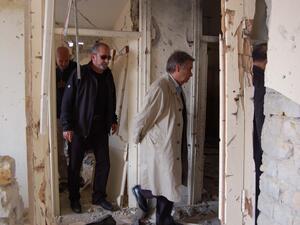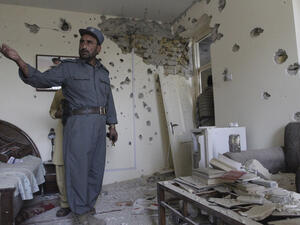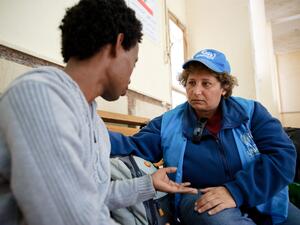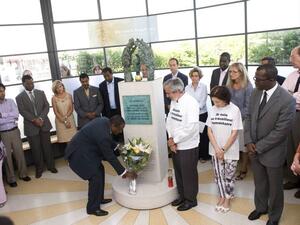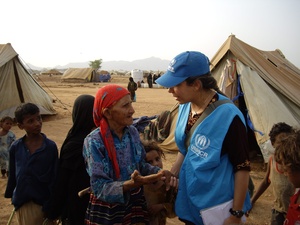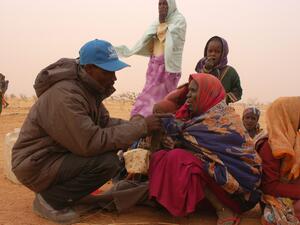UNHCR pays tribute to fallen colleagues
UNHCR pays tribute to fallen colleagues
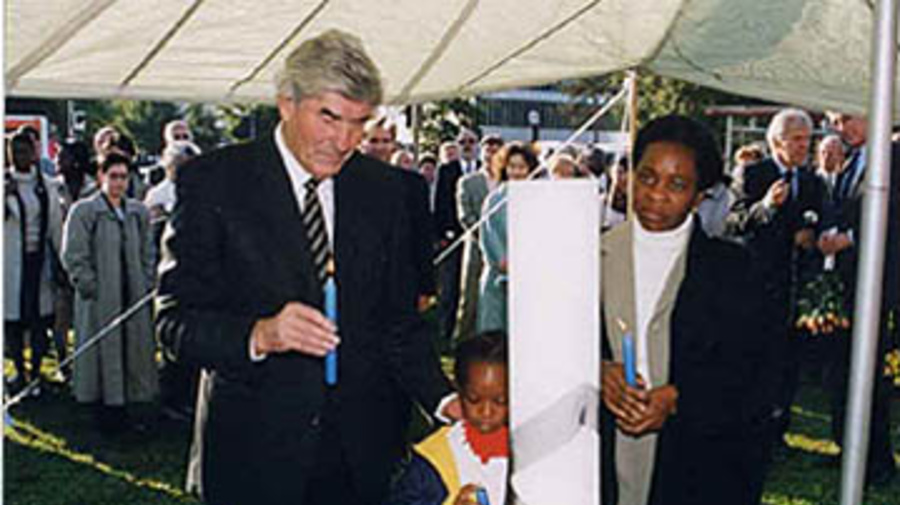
In Remembrance: High Commissioner Lubbers joins widow Laetitia and daughter Tania of murdered UNHCR worker Mensah Kpognon.
GENEVA (UNHCR) - Honouring colleagues who have lost their lives in the field, UNHCR staff on Wednesday called for more international efforts to ensure the safety and security of humanitarian workers and the millions of people they help around the world.
"A year ago this month, UNHCR experienced the darkest period in its entire 50-year history when four of our colleagues were brutally murdered within two weeks," High Commissioner Ruud Lubbers said. "Six months later, another UNHCR staff member was killed in the Democratic Republic of the Congo."
"Today, as we honour our slain friends and co-workers, I must also declare my continuing anger and frustration that true justice has not yet been served in any of these tragic cases."
Lubbers, other senior UNHCR officials and members of the agency's Staff Council gathered in front of Geneva's Palais des Nations on Wednesday morning, lighting a candle and placing flowers to pay tribute to all humanitarian workers who have lost their lives. UNHCR staff and others were expected to bring flowers to the site throughout the day. They are also collecting funds for a permanent memorial in front of the agency's Geneva headquarters.
UNHCR is particularly disturbed by the light sentences given by a Jakarta court to six men in connection with the killing last year of three UNHCR staff members in Atambua, West Timor. The men were given sentences ranging from 10 to 20 months for the 6 Sept. 2000 killings of Pero Simundza, Samson Aregahegn and Carlos Caceres at the UNHCR office in Atambua. The sentences were recently upheld by a Jakarta appeals court.
The brutality of the murders - the victims were hacked to death and their bodies burned - shocked the international community and led to the evacuation of U.N. and other aid workers from West Timor.
Assistant High Commissioner Søren Jessen-Petersen, who was in Indonesia earlier this month when the appeals court announced its decision, said the light sentences made a mockery of the international community's insistence that justice be done in this horrific case. Jessen-Petersen said the outcome had left everyone at UNHCR extremely disappointed and sent "exactly the wrong message to others who may now think they can kill humanitarian workers with impunity."
Remaining unsolved are the murders of Mr. Mensah Kpognon, UNHCR's head of office in the south-east Guinea town of Macenta, who was gunned down in a 17 September 2000 attack by unknown gunmen; and Mr. Nsakala Tshiama, a driver in UNHCR's office in the western Democratic Republic of the Congo town of Kimpese, who was shot and killed on 27 March 2001.
Naveed Hussain, chairman of the UNHCR Staff Council, said the agency's message to governments was clear. "If you want us to continue saving lives, you must protect our own," he said. "We look towards governments to assume their responsibility for ensuring the safety of humanitarian workers. Stronger action must also be taken against states that fail to fulfil this responsibility. Lack of such measures against Indonesia, for example, allowed the killers to get away with the murder. This is unacceptable."



